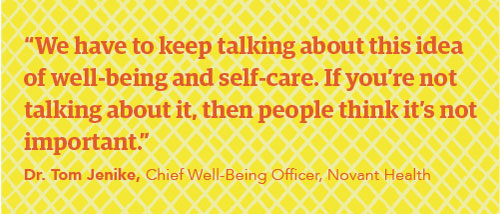
Nearly two-thirds (63%) of physicians and nurses are experiencing , but only . With and alarmingly high , it’s more important than ever for healthcare organizations to focus on provider wellness. Many companies are stepping up efforts to address the problem, but and have taken a particularly bold approach toward improving provider well-being. Here are seven ways the two organizations are working to make life better for everyone on their team.
1. Changing the mindset
On a flight, passengers are instructed to secure their own oxygen mask before helping others. Similarly, healthcare providers need to take care of themselves before they can effectively care for patients.
“There’s a historical mindset inside healthcare that the person who does the most, who stays up the latest, who has the least amount of sleep gets celebrated,” says Dr. Tom Jenike, senior vice president, chief well-being officer for Novant Health. “We’re trying to flip that mindset.”
“Providers need to understand that when they’re sleep deprived, burned out, and emotionally and physically unwell, they can’t provide the best level of care,” he says. “If you’re committed to high performance, then you have to not only put yourself on the priority list, but you actually have to put yourself first. With this new mindset, we are proud of those that are rigorous with their self-care. If you’re not taking time for yourself, we would worry about your ability to sustain your performance.”
2. Taking a systemic view
Another change of mindset is the idea that burnout is an individual problem — that providers are responsible to solve the problem themselves. That’s why leaders at UPMC created , an initiative intended to make systemic improvements on practice efficiency and communication to improve provider well-being.
Cardiologist Dr. Jennifer Berliner is director of physician well-being and co-chair of the UPMC’s Physician Thrive committee. “We all know about personal resilience and how important it is for reducing burnout — and no doubt that's extremely important — but we really focus on initiatives that will improve the system,” she says. “A lot of burnout is a problem that comes from the work that we do. So just telling physicians that they should eat healthier, exercise more — although there's very good data to support that — that's not really what we focus on.”
3. Supporting provider wellness from the very top
Healthcare providers need to hear directly from the top levels of leadership that self-care and well-being are important. And they need to hear it regularly enough that they start to believe leadership actually means it.
“We have to keep talking about this idea of well-being and self-care,” Dr. Jenike says. “If you’re not talking about it, then people think it’s not important. So we have an ongoing drumbeat of messages that self-care isn’t selfish, it’s required. Further, self-care is not all on you. The organization has a responsibility to create systems and culture that support personal well-being and professional satisfaction. These messages come from our CEO and then we cascade down throughout the organization — it’s a constant stream of communication and messaging around how if we want to be world-class at caring for our patients we have to be world-class at caring for our people.”
UPMC’s chief medical officer visits regularly with small groups of physicians to “really open up communication,” Dr. Berliner says, and to dispel the perception of a disconnect between leadership and providers. “There's really no agenda in these meetings, besides creating open loops of communication where people can share their experiences.”

4. Asking providers what they need
Too often, organizations try to solve problems without getting input from the people they intend to help. That's why at UPMC, “we try to have open communication with physicians,” Dr. Berliner says. “We have a well-being committee and champions from all of our departments to try to have open communication about the issues we can help them with.”
Novant Health collects data through surveys to better understand what their providers are experiencing. “We have a very specific way we ask questions around stress, burnout, how people are thriving in their life. We keep asking, and then we can slice that data down. We can look at certain job families and then direct resources and support in a more targeted manner,” Dr. Jenike says. “It’s a big deal to keep asking people how they’re really doing and what most impacts their stress and well-being.”
5. Removing barriers to accessing support
“We've spent a good amount of time trying to improve mental healthcare access for physicians,” Dr. Berliner explains. For example, UPMC deployed a hotline that physicians or their family members can call to speak with a trained operator who can provide a “warm handoff” to mental health services.
Novant Health developed a web-based platform called that aggregates “any sort of holistic well-being needs, whether it be for your financial health, emotional health, mental health, physical health. It’s a hub of resources,” Dr. Jenike says.
6. Offering trained peer coaches
Trained peer coaches are often uniquely positioned to help a colleague in distress. Novant Health has a “rapid response team” for physicians. “If there’s a physician in need or crisis, rather than having only an EAP to go through, there’s a group of physician colleagues who are trained and ready to have conversations and then help to connect them to resources,” Dr. Jenike says.
During the pandemic, Novant Health started a peer support group for ICU nurses and others who were impacted by the trauma of COVID-19 deaths. “These support services are available real-time for people who are having post-traumatic stress,” Dr. Jenike explains.
Similarly, UPMC offers a peer support program called Physicians for Physicians. “If you have a bad outcome or a negative interaction with a patient — or any other issue you'd like to speak to a peer about — we have trained physicians who are on call 24 hours a day, seven days a week, to help talk you through the issue,” Dr. Berliner says.
7. Creating wellness champions
The Well-being and Resiliency team at Novant Health comprises a team of five people, and “there’s no way five people can look out for 37,000 people,” Dr. Jenike says. Instead, well-being is woven throughout the organization. In addition to leaders at all levels personifying the culture, Novant Health has trained roughly 600 “emotional health advocates” from across the organization. “They trained on how to listen empathetically, how to give some basic coaching — not to become behavioral health experts but at least be able to have difficult conversations — and then be very well versed in all the resources that are available.”
Dr. Jenike says the program was born out of the pandemic. “It’s a way to scale it to the degree where it gets down into the organization through champions who are taking care of themselves first and then looking carefully at the people they work around and keeping their ears open for any sign of struggle.”
Watching the needle move
The effort to support healthcare provider wellness is a long-term commitment for any organization, but the effort can make a measurable difference.
“If you compare the people who have the belief that their company and their leader are committed and care about their well-being — those who can answer affirmatively, ‘Yes, my company and my leader care about my well-being,’ — versus those who answer ‘no,’ the data is staggering. For the people who answer affirmatively, their level of burnout is way down, their level of finding joy and meaning in work is way up, their commitment to the organization is way up,” Dr. Jenike says. “If we can get across to our people that we don’t just care about you as a nurse or as a doctor or as an administrative leader, we care about you as a human being — and we can make that real — then they are more likely to be thriving in their life and want to stay at our organization.”
���ǹ������ֳ� can provide your organization with the physicians and advanced practice providers you need to grow your organization. To learn more, contact us by phone at 866.588.5996 or email ecs.contact@chghealthcare.com.